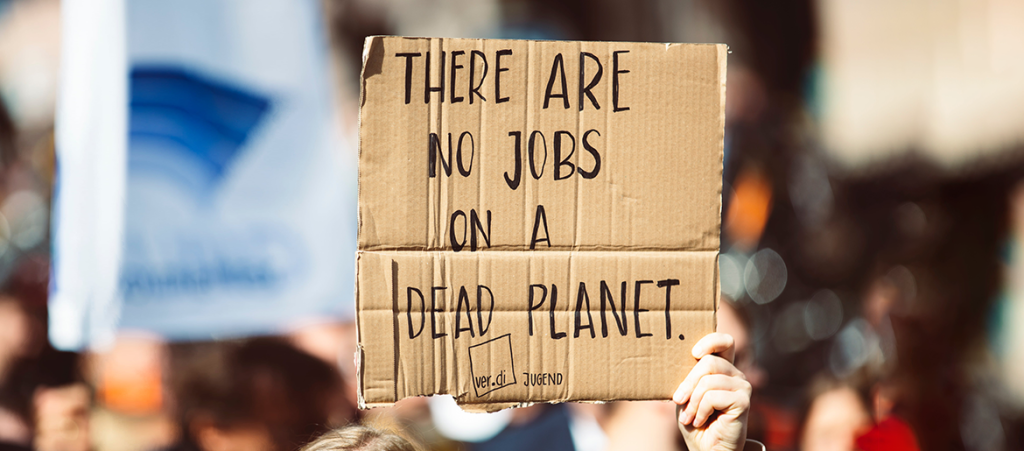
Cyclone Jasper is absolutely hammering Far North Queensland right now, with the army called in to help evacuate entire towns. It feels eerily like when the Defence Force were called to help during the floods in Lismore in 2022. And the Black Summer bushfires in 2019. As a whole, 2023 is set to be the hottest in 125,000 years, breaking several heat records. The world is currently on track to hit 2.9ºC of ‘disastrous heating’ (anything above 1.5ºC is not safe). “We’re at that point where it’s all hands on deck. Everybody needs to move,” Laure Legros, from non-government organisation WorkforClimate, tells me.
I agree, of course. But when politicians refuse to listen to the increasingly desperate calls from the public to act, where is the next best place to direct our activism? At WorkforClimate, the answer is the business sector. And they’re training a generation of ‘employee activists’ to push businesses, big and small, to adopt climate-friendly, sustainable practices.
Through a combination of online learning modules, monthly coaching sessions and peer support, the WorkforClimate Academy teaches some fundamentals about emissions and decarbonisation, but mostly focuses on the skills and techniques to convince decision makers to take action. “It’s teaching people how to use their influencing power and developing leadership abilities to to accomplish ambitious climate action for their companies,” Laure says. “For example, it could be that the company hasn’t done anything on renewable energy and you want to advocate for that. We don’t expect you to have to learn how renewable energy works, it’s more about creating the conditions for that initiative to happen in your company.”
Graduates from the WorkforClimate Academy have successfully convinced their companies to switch to renewable energy, start decarbonisation projects, transition car fleets to electric vehicles, and set climate-safe funds as the default superannuation option. The success stories are impressive, Laure explains it can take a range of tactics to get there – just like there are activists who march, those who write poetry, those who lobby governments and those who chain themselves to machinery. “We want to show people the possibilities of all of these tactics that can be deployed [as an employee activist], on the spectrum of collaborative to combative. When to employ which tactic and how to go about deploying them.” That includes anything from spending a year preparing a business case (collaborative), to coordinating an employee walkout (combative).
Powerful stuff, but will a young person in an entry-level role really be able to have that kind of influence? The folks in charge don’t listen to us as it is. “Even though younger people may not be in that position of formal power, they can have influence in bringing passionate people together, identifying the issues, and then going and making the ask,” Laure says. Instead of going directly to the top, Laure suggests working your advocacy magic sideways. “If one employee goes to HR and says ‘Hey, can we switch our default superannuation option to a fossil-free one?’ They’re not very likely to get a lot of traction. But let’s say they talk to their colleagues and get 50 coworkers on board with this idea. Now there’s 50 people at the door asking the same question, and it becomes an entirely different paradigm.” That’s how unions work, and the same worker solidarity tactics can be used for climate action.
Another very important thing young people can do is educate themselves on greenwashing, how to read between the lines of the business eco-claims. Laure says WorkforClimate considers itself to be the ‘anti-greenwashing school’, and is transparent with companies that their courses will prompt staff to ask tough questions. “We need people to have a good foundational understanding of sustainability that goes beyond general speech around corporate sustainability. Like, what does it mean when a company says they’re going ‘carbon neutral’? When they’re talking about a transition plan or being aligned with 1.5ºC? We unpack that and then get to the ‘influencing’ part.”
Big corporations in particular are very aware that being climate villains will see them lose out on great talent. They are using the opportunity now, while economic conditions are particularly brutal on young people, to entice workers with big salaries, benefits and the promise of security. The new year is an essential time for us all to check-in on our personal values, and the boundaries that protect them. “We talk a lot about ‘What can I do?’ but sometimes it’s helpful to reframe the question as ‘what will I say no to?’”
Economics have always been used as the primary excuse to delay action, and the current cost-of-living crisis has stripped many people of leverage with their employers. But we cannot shut up about the changes that need to be made, reminding powers-that-be: “The economic rules, they can be bent. But the biophysical rules, they cannot be bent. I go back to this statement that there is no business on a dead planet.” First and foremost, the role of an employee activist is to be a present, persistent reminder of this fact to their bosses, every single day.
Smart people read more:
Every Issue You Care About Is Connected To Climate Justice
Climate quitting won’t stop the fossil fuel companies – Solidarity.net.au

Comments are closed.